- Home
- Michael Wolff
The Man Who Owns the News: Inside the Secret World of Rupert Murdoch
The Man Who Owns the News: Inside the Secret World of Rupert Murdoch Read online
CONTENTS
Title Page
Dedication
Acknowledgments
Prologue: His Message
Chapter One: The Butterfly Effect
Chapter Two: Around the Corner
Chapter Three: The Throwback
Chapter Four: Opposing Families
Chapter Five: The Outsider
Chapter Six: His Art
Chapter Seven: The Eighties—Business Guys
Chapter Eight: It’s a Tabloid World
Chapter Nine: Who’s the Boss?
Chapter Ten: Rupertism
Chapter Eleven: The Nineties—The Amazing Mr. M.
Chapter Twelve: Rupert in Love
Chapter Thirteen: The Ecology
Chapter Fourteen: Dynasty
Chapter Fifteen: Putting the Deal to Bed
Epilogue: The Proprietor
Endnotes
Bibliography
Also by Michael Wolff
Copyright
For my mother
the first newspaper person in our family
ACKNOWLEDGMENTS
It’s important to get lucky when you write a book. My first stroke of good fortune happened when my daughter Elizabeth introduced me to her colleague Leela de Kretser, a reporter at the New York Post. My next stroke was that Leela was extremely pregnant and looking for a job with more flexible hours for after her baby’s birth. My next was that before the Post, Leela had been a reporter at the Herald Sun, Murdoch’s paper in Melbourne, where she grew up. An Aussie who’s worked for two Murdoch papers to help with the research for a book about Murdoch—that’s striking gold. My good luck has again and again been compounded by her keen perceptiveness about all things Murdoch, her fine-tuned interviewing skills, her in-the-trenches knowledge of the news business, and her unflagging humor. In twelve months we have done more than 120 interviews together, crossed Australia, and sat for more than fifty hours with the book’s subject. It may take an Australian to know one. Leela has talked out every aspect of the book with me, been as acute an analyst of News Corp.’s customs as anyone I’ve consulted, and somehow made all the trains of this project run on time. This book rests as much on her shoulders as my own—the mistakes will have undoubtedly come in those instances where I ignored her warnings and advice.
My friend of twenty years, Christopher Silvester, a Fleet Street diarist of long standing, helped track down old Murdoch hands in London, convince a wide assortment of Murdoch’s current British friends and foes to chat about him, assemble the surprisingly large body of Murdoch literature, skillfully conduct some of the notable background interviews for the book, and read the manuscript with patience and a keen eye.
Simon Dumenco, who may well have edited as many words of mine as any editor has for any writer, read this manuscript with the greatest care and offered the wisest of counsel, saving me from countless instances of excess and embarrassment.
This project began in the summer of 2007 in a column I wrote for Vanity Fair about the Dow Jones takeover. My VF colleague Doug Stumpf was the first to see the possibilities for this material as the basis of a book and urged me forward. VF’s editor, Graydon Carter, provided some of the initial insights that form the portrait of a new and evolving Murdoch. All of my colleagues at the magazine have been extraordinarily supportive of the project—and tolerant of my obsession with KRM.
My editor at Random House, Phyllis Grann, and her colleagues Steve Rubin, Bill Thomas, David Drake, Kathy Trager, and Jackeline Montalvo have been enthusiastic, discerning, and smart publishers—and fast, too, turning around a complicated manuscript on a relative dime. Their colleagues in London, Gail Rebuck and Dan Hind, have also worked with speed and good humor. Dan deserves special thanks for helping me through that most galling, pernicious, and absurd literary process: a British libel read.
And then there is Andrew Wylie, my agent. I called Andrew about the possibility of doing a book involving Murdoch and Dow Jones on a Friday afternoon in August 2007. Before the following Friday he had helped shape a proposal, conducted an auction, and scored me a publisher. Watching him work that week was one of the most awesome things I’ve seen in thirty years of trying to find someone who knows what they’re doing in the book business.
This book, in its twelve months from inception to completion, has depended on many hands. That includes Danit Lidor, Jackie Cook, Mark Bowker, Lisa Payton, Kim Carollo, Kate Hammer, Rehaneh de Kretser, Jennifer Fishbein, Sheldon Gravesande, and Genevieve Gorta, who did the transcribing of hundreds of hours of interviews. It also includes Michelle Memran, my Vanity Fair colleague, who with Marni Hanel, Joanne Gerber, Danit Lidor, and Althea Chang fact-checked the manuscript.
None of this would have been possible without the singular cooperation of this book’s subject, who not only was (mostly) a patient and convivial interviewee but also opened every door I asked him to open. He has been as helpful in facilitating this book as I can imagine any CEO ever being with a writer who owes him nothing. Indeed, he asked for nothing in return for his openness and cooperation. Likewise, News Corp. executives in New York, Los Angeles, London, Melbourne, and Sydney have been as generous and expansive in discussing their boss as I might have hoped—all of them being as fascinated by him as I am. Members of the Murdoch family—wife Wendi, daughters Prudence and Elisabeth, sons Lachlan and James, sons-in-law Matthew Freud and Alasdair MacLeod, sisters Janet Calvert Jones and Ann Kantor, nephew Matt Handbury, and mother, the remarkable Dame Elisabeth—have made the time to help me and each has been thoughtful, straightforward, and in almost every case uncommonly perceptive about their family, the family business, and, not least of all, the subject at hand. In the end, however, only Dot Wyndoe, Rupert Murdoch’s personal assistant for more than forty years, could be reliably counted on to schedule a meeting, supply a specific piece of information, or locate an address—she’s made everything so much easier.
Gary Ginsberg, News Corp.’s executive vice president, global marketing and corporate affairs, has been unfailingly helpful throughout this process. And while I have—rather often, I’m afraid—deviated from his guidance, disagreed with his views, and, I suspect, undermined his interests, he has been, and I hope will remain, a good friend.
Andrew Butcher, who joined News Corp. as a copyboy straight out of high school and rose to be a longtime spokesman for the company, has been an invaluable guide into the News Corp. culture. He has in too many instances to count made sense of what at News has not seemed to make any sense at all. This book is vastly smarter for his having shared his insights.
Dow Jones executives, both past and present, along with many Wall Street Journal staffers have been extremely forthcoming with time and information. Members of the Bancroft family, all of whom have spoken off the record, have been keen to have me understand the complicated currents and diverse characters within the family, as well as the real story of the takeover, so often very different from the way it was told, not least of all by their own paper.
Everybody in my family has not just lived all the details of my year with Rupert Murdoch, but has offered some pretty good advice (unsolicited or not).
And it is not just my family who has endured this book and pitched in when needed. Janon Fisher, Leela’s husband and a newspaper reporter, has shared insights and extended great patience. Chris de Kretser, in Melbourne, Leela’s father and a newspaperman for more than forty years, sat up over many nights reading the manuscript with an eagle eye, catching all sorts of errors of fact and carelessness.
The following people have been intervie
wed for this book, have shared valuable information about its subject, or have offered useful advice about its creation. I owe them, as well as numerous others who have asked to remain anonymous, a great debt:
Col Allan, editor in chief, New York Post; Jesse Angelo, managing editor, New York Post; Ken Auletta, New Yorker staff writer; Vicky Barnsley, CEO, HarperCollins UK; Richard Beattie, attorney for Simpson, Thacher and Bartlett, LLP; Emily Bell, director of digital content for Guardian News and Media; Simon Bax, former chief financial officer of Fox Filmed Entertainment; Tony Blair, former prime minister of the United Kingdom; Mark Booth, former CEO, BSky B; Maggie Brown, British journalist; Charlie Burgess, Fleet Street editor; Peter Chernin, president and COO of News Corp.; Michael Costa, media banker, Merrill Lynch; Gordon Crovitz, former publisher of the Wall Street Journal; Gary Davey, former CEO, Star TV; Barry Diller, chairman and CEO of IAC/InterActive Corp.; Matthew d’Ancona, editor, Spectator magazine; Jeremy Deedes, former managing director of the Telegraph Group; John Dolgen, former chairman, Paramount Pictures; Sir Rod Eddington, director of News Corp.; Karen Elliott House, former publisher of the Wall Street Journal; Edward Jay Epstein, author; David Faber, CNBC chief correspondent; Philip Falcone, senior managing director, Harbinger Capital Partners; Ivan Fallon, chief executive, Independent News and Media UK; Steve Fishman, New York magazine writer; Jonathan Foreman, former New York Post reporter; Michael Fuchs, former head of HBO; Michael Garin, a founder of Lorimar Telepictures; Stephen Glover, British journalist and one of the founders of the Independent; Roy Greenslade, media columnist and commentator, the Guardian; Richard Greenfield, Wall Street media analyst at Pali Research; James C. Goodale, former general counsel and vice chairman of the New York Times Company; James Harding, editor in chief, Times of London; Bert Hardy, former chief of News International; John Hartigan, chairman and CEO of News Limited; Tony Hendra, author and humorist; Les Hinton, CEO of Dow Jones; Alan Howe, former Sunday Herald Sun editor; John Huey, editor in chief, Time, Inc.; Arianna Huffington, co-founder and editor in chief of the Huffington Post; Sir Bernard Ingham, Margaret Thatcher’s former press secretary; Richard Ingrams, co-founder and former editor of Private Eye; Jay Itzkowitz, former senior corporate lawyer at Fox Entertainment; Michael Jackson, television and news media executive; Sir Simon Jenkins, columnist, the Guardian, former editor of the Times of London and the Evening Standard; Lon Jacobs, News Corp. general counsel; Michael Jones, former political editor of the Sunday Times; Peter Kann, former CEO, Dow Jones; Trevor Kavanagh, former political editor of the Sun; Sir Chips Keswick, former Murdoch banker at Hambros Bank; Robert Kindler, vice chairman for investment banking at Morgan Stanley; Jonathan Knee, Wall Street banker; Andrew Knight, director of News Corp.; Phillip Knightley, author of The First Casualty and former Sunday Times reporter; Ed Kosner, former editor of New York magazine; Dominic Lawson, former editor of the Sunday Telegraph; James B. Lee Jr., vice chairman, JPMorgan Chase; Joanne Lipman, former Wall Street Journal editor; Sir Nick Lloyd, former editor of News of the World; Frank Luntz, political consultant; Brian MacArthur, former editor at the Times of London and the Sunday Times; Stephen Mayne, Crikey founder; Tom McGrath, entertainment and media executive, former chief operating officer of the Viacom Entertainment Group; Bill Mechanic, former CEO and chairman of Fox Studios; John Micklethwait, editor of the Economist; Kelvin MacKenzie, former editor in chief of the Sun; Piers Morgan, former editor in chief of the News of the World and the Daily Mirror; John Motavalli, author of Bamboozled at the Revolution; John Nallen, News Corp. deputy CFO; Andrew Neil, former editor in chief, Sunday Times; Mark Oliver, media consultant, CEO, Oliver and Ohlbaum Associates; Norm Pearlstine, chief content officer at Bloomberg; M. Peter McPherson, former chairman of the board of Dow Jones; David Penberthy, Sydney Daily Telegraph editor; Chapman Pincher, Daily Express reporter; Mario Platero, U.S. editor, Il Sole 24 Ore; Joyce Purnick, reporter for the New York Times and reporter at the New York Post at the time of the Murdoch takeover; Jeff Randall, business reporter for the Daily Telegraph and former editor at the Sunday Times; Jane Reed, director of Times Newspapers Limited; William Rees-Mogg, former editor of the Times of London; Arthur Siskind, former News Corp. general counsel; Andrew Ross Sorkin, business reporter for the New York Times; Roger Smith, Wall Street analyst and former Warner Communications executive; Michael Schrage, former Washington Post media business reporter; Malcolm Schmidtke, former editor of the Sunday Age; Stanley Shuman, managing director of Allen and Company LLC; Anne Spackman, editor in chief, Times Online, Times of London; Patrick Spain, CEO of HighBeam Research; Rob Spatt, attorney for Simpson, Thacher and Bartlett, LLP; Paul Steiger, former managing editor of the Wall Street Journal; Irwin Stelzer, economist and Murdoch confidant; Cita Stelzer, research associate, Hudson Institute; Andrew Steginsky, fund manager; Peter Stoddard, former editor of the Times of London; Robert Thomson, editor in chief, the Wall Street Journal, former editor in chief, the Times of London; Richard Tofel, former Dow Jones senior executive; Donald Trelford, former editor in chief of the Observer; Rebekah Wade, editor in chief, the Sun; Jonathan Wald, senior vice president for business news, CNBC; Lord Wakeham, former British MP; Jann Wenner, founder of Rolling Stone; Francis Wheen, Private Eye; Robert Wiesenthal, executive vice president and chief financial officer, Sony Corporation of America; Charlie Wilson, former editor of the Times of London; Petronella Wyatt, reporter for the Daily Mail, daughter of Murdoch confidant Woodrow Wyatt; David Yelland, former editor of the Sun; Richard Zannino, former CEO, Dow Jones; Mortimer Zuckerman, proprietor of the New York Daily News.
Lastly, my appreciation to Claridge’s in London, where so many of the interviews for this book took place. Claridge’s, a hotel possessed of virtues of a prior age, actually has a fondness for writers and has, on my many trips to London for this book, cosseted me in style, looked after me with care and interest, provided me with a home away from home (far better than my actual home), and demonstrated over and over again that old saw that, given the choice, a civilized man might well prefer to go Claridge’s rather than to heaven.
PROLOGUE His Message
FALL 2007–WINTER 2008
Rupert Murdoch, a man without discernible hubris—or at least conventional grandiosity—had nevertheless begun to believe that his takeover of Dow Jones and the Wall Street Journal, something he’d dreamt about for most of his career, might actually indicate that he and his company, News Corporation, had a certain destiny, a higher purpose of which the world should be made aware.
He’d started to think that his triumph in the quest for Dow Jones was an opportunity to rebrand—the kind of marketing frippery he usually disdained. He was even toying with the idea of changing the name of News Corp., that oddly boring, generic-sounding throwback to the company’s earliest days—his first paper in Adelaide, Australia, was the News—to something that could better indicate his and News Corp.’s philosophical reason for being.
What that reason for being exactly was…well, um…that was still hard to actually put into words. But it had something to do with…well, look at these:
He had mock-ups of full-page ads that, he was thinking, should run in all the Wall Street Journal’s competitors—particularly the New York Times and the Financial Times—on the day he took over the paper.
One of the ads had the big headline “Agent Provocateur.” Another pursued the idea of pirates—the notion being that for more than fifty years the company had been…well, if not exactly outlaws…not literally, still…
When, after many hours of conversation with Murdoch, I despaired of ever getting an introspective word out of him, his son-in-law Matthew Freud, the PR man from London, advised me to ask him about “being a change agent.”
This conversational gambit prompted Murdoch’s enthusiastic unfurling of these ads and eager, if far from concrete, ideas—“We’re change agents,” he kept repeating, as though new to the notion—about the meaning of News Corp. and, by extension, himself. It also prompted dubious looks from some of the executives
closest to him. Murdoch’s sudden search for an ennobling and guiding idea was a vexation not just because it called attention to exactly what News Corp. executives often despaired of—that image of run-amok ruthlessness that the battle for Dow Jones had stirred up all over again—but also because it was distinctly out of character.
Soul-searching wasn’t, to say the least, a part of the News Corp. culture. So it was curious, and unsettling, to have the veritable soul of the company trying to figure out why he’d gotten where he’d gotten, and for what good reason.
Such a statement about his fundamental righteousness (and even, perhaps, relative coolness) was, significantly, being urged on him by his son James, a Harvard dropout who had started a music label and then spearheaded News Corp.’s new-media initiatives in the 1990s, and who had become the CEO of British Sky Broadcasting (BSkyB), the News Corp.–controlled company that operates the Sky satellite TV network in the United Kingdom. Not long before, Murdoch had favored his older son, Lachlan, and before that his daughter Elisabeth, to eventually run News Corp. But now it was James. In fact, unbeknownst to the rest of News Corp., James was about to be given responsibility for the U.K., Europe, and Asia by his father—who wanted to spend more of his time at the Wall Street Journal and, in addition, wanted to use the opportunity to put James in reach of the top spot in the company (without having to actually turn over the top spot).
James had been, much more so than his father, particularly aggravated by the terrible press heaped on his dad and on the company because of the Dow Jones bid. Alternately aggressive and defensive, James was looking for a way to fight back. In fact, it was not entirely clear that the father’s sudden enthusiasm for brand development wasn’t about pleasing his son, clearly the apple of his eye at this moment. (He was very excited about showing off BSkyB’s annual report, for which his son was responsible and which he thought was the kind of thing they could be doing at News Corp.—every employee, he said, as though new to the novelty of an expensively produced annual report, could get one!) There was enough triumphalism around News Corp. to please everybody.

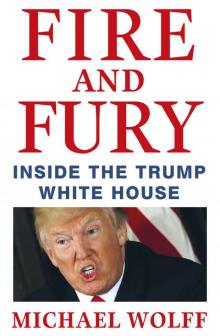 Fire and Fury
Fire and Fury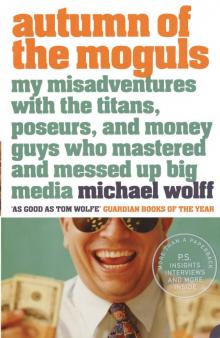 Autumn of the Moguls
Autumn of the Moguls Sefiros Eishi: Chased By War (The Smoke and Mirrors Saga Book 2)
Sefiros Eishi: Chased By War (The Smoke and Mirrors Saga Book 2)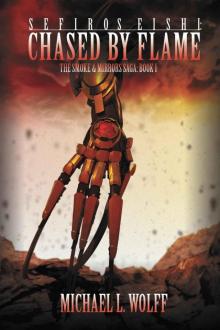 Sefiros Eishi: Chased By Flame
Sefiros Eishi: Chased By Flame Chased By War
Chased By War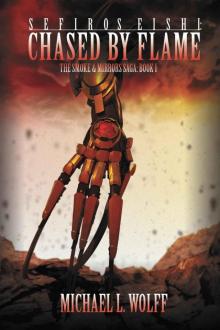 Chased By Flame
Chased By Flame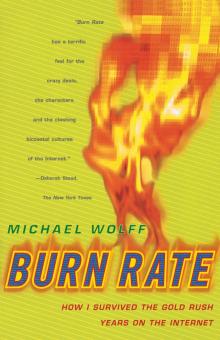 Burn Rate
Burn Rate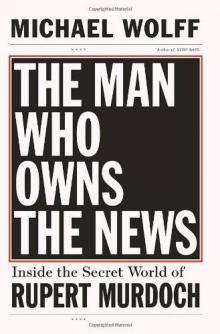 The Man Who Owns the News: Inside the Secret World of Rupert Murdoch
The Man Who Owns the News: Inside the Secret World of Rupert Murdoch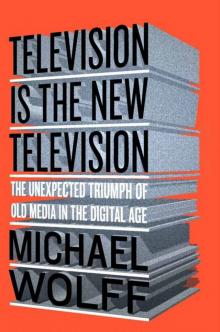 Television Is the New Television
Television Is the New Television